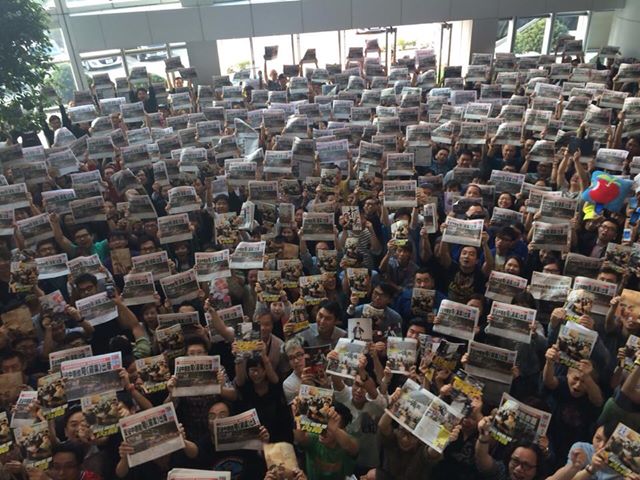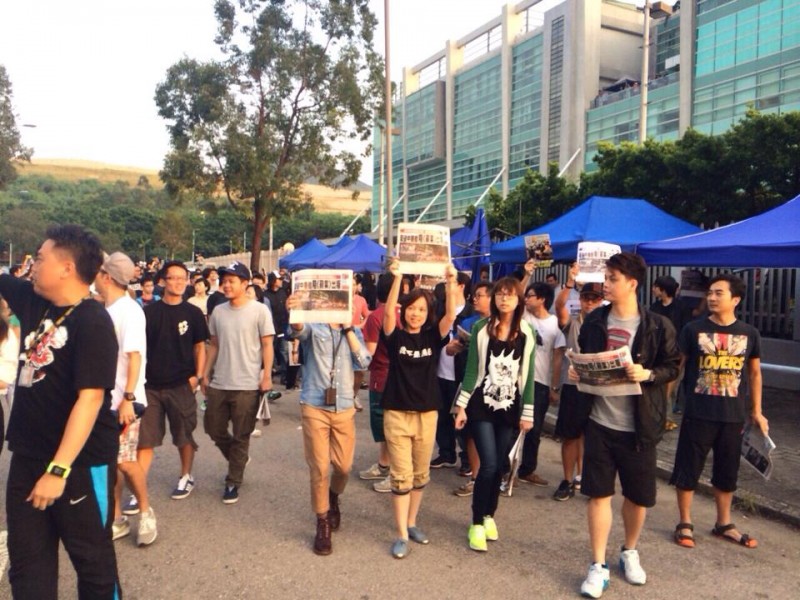
Staff from Apple Daily News showed their determination to keep the newsroom operating after a mob attack on October 13. Photo from Chan Pui Man's Facebook page.
Journalists working in Hong Kong have come under tremendous pressure in recent weeks for covering news on the Umbrella Revolution, the pro-democracy protests demanding free and fair elections. Not only have they exposed themselves to violence while covering clashes between police and protesters, when they return to the office from the field, some of them have to endure the push for self-censorship from the newsroom or even harassment from pro-Beijing thugs.
Since police began removing barricades set up by protesters at the sites of the massive sit-in dubbed Occupy Central, confrontations between protesters and police officers have happened almost every day. Standing between the police and protesters, photojournalists have become vulnerable to injuries themselves. It is not uncommon to see TV station cameramen being pepper sprayed or pushed away by police officers during the news report. In some cases, the police do not differentiate between protesters and reporters and assault them when they take photos of the front-line.
Four independent news sites — inmediahk.net, SocREC, USP and Local Press — issued a joint statement condemning the police for intentionally attacking reporters on October 15 when they dispersed protesters on Lung Wo Road outside government headquarters:
凌晨三點,SocREC一名攝影記者則在添馬公園採訪清場,被持防暴裝備的警察強行拉入警員堆之中,拳打腳踢接近30秒,記者的眼鏡、頭盔以及眼罩被打至飛脫。一輪暴打後,兩名警員把該名記者拖行近30秒,送上警察押送犯人的旅遊巴上。拖行期間,受傷記者不停向警察展示記者證,但警察依然没有停止毆打,更用粗口辱罵記者。記者在旅遊巴上,有負責應付傳媒的警員確認SocREC記者身份後,著令他下車。記者事後已去瑪麗醫院驗傷,證實面部、額頭、鼻、嘴角、頸部以及左手手臂都有明顯傷痕。
同一時間,獨媒其一中名攝影記者在龍和道隧道內採訪期間,一名警察突然上前用胡椒噴霧指嚇他,記者遵從警員指示後退,但警察仍然在毫無警示下多次正面對準記者面部發射胡椒噴霧;後來,該記者雖然多次重申記者身份,警察仍然把他雙手扭轉並押走。其後警察更對記者吆喝:「記者又點,記者大哂?」、「記者又點,記者唔可以行前影相架嘛!」,警察確認記者身份之後放行。而另一名獨媒記者在後退時,亦遭警員用圓盾撞傷頭部。
At 3 a.m., when covering the clearing of Tamar Park, a reporter from SocREC was pulled into the side of the riot police's line and beat up for about 30 seconds. Later, two police officers dragged him along the road for 30 seconds and threw him into a police detention van. The wounded reporter repeatedly displayed his press badge during the ordinal, but it did not stop them. Instead, they abused him verbally. Only after a police press officer confirmed his identity inside the van was he allowed to leave. The reporter sought treatment at the Queen Mary Hospital and the clinical report found obvious injures on his face, forehead, nose, mouth, neck and left arm.
Similarly, a reporter from inmediahk.net covering the news inside a tunnel on Lung Wo Road was suddenly threatened by a police officer with pepper spray. He followed the officer's instruction and backed off, but was sprayed in his face without warning; although he showed his press badge many times, he was arrested and handcuffed. In the process, the police officer yelled: “Reporter? So what?” “Even reporters cannot take photos from the front.” He was released after his identity was clarified. Another inmediahk.net reporter was hit in the head by a riot police officer with his shield while he was backing off.
Even if reporters at the front-line risk physical injuries to cover the news, their stories might not be published because of self-censorship practices in the newsroom. Many news organizations in Hong Kong, a special administrative region of China, were already fearful of losing advertising revenue from their business ties in the mainland or angering the Beijing government. This trend has only increased with the recent protests calling for an open nomination system of candidates for the city's chief executive, which goes against the mainland's wish for a largely pro-Beijing nominating committee.
On October 15, the chief news executive of TVB, the city's most popular television station, ordered the news team to edit a voice-over describing a video report on alleged police brutality. The footage clearly showed a handcuffed protester punched and kicked by several police officers in a dark corner for four minutes.
The next day, 28 staff members from the newsroom issued a joint statement expressing regret over the management's decision. So far more than 100 staffs from the station's news branch have co-signed it.
A former TVB reporter Au Ka Lun explained how the TVB newsroom operates after he read the joint statement:
這份行文平淡的聲明,一字一句,都是血與淚;我讀到了,我記起了,我們這一代記者,無止境的屈辱與掙扎,理想與現實的差距,去與留之間的徘徊。[…]
很多時,前綫記者,就只負責採訪,他們是「車衣女工」,只是新聞製作過程的一環。很多時,採訪完畢,片段送回公司,稿不是他們寫的,內容的編輯與選材,也不是前綫記者全權決定的,新聞部裡,有很多編輯,有很多採主,編輯採主之上,還有一個人;一個人之上,有強橫的勢力。記者最自由自主的時間,就是那一個人睡覺的時間,而他睡很少。
Every word in this plain statement is written in blood and sweat. I read it and remembered the endless humiliation and struggle our generation of reporters has faced. The huge gap between ideal and reality and whether one should stay or leave is always a struggle. […]
Most of the time, the reporters on the front-line are only responsible for interviews and recording what happens onsite. They are like the workers in the sweatshop, responsible for a part of the news making. After they have done their work, the footage would be sent back to the newsroom. They won't be responsible for the script. The content and the focus cannot be decided by the reporters. In the newsroom, there are many news and assignment editors, and above them there is one more person in charge. Above that person are even greater forces. Reporters are not free and autonomous; they are only free when that single person is asleep, but he sleeps very little.
The “greater forces” referred to by Au are the different forms of political pressure coming from Beijing, such as smears or even violent threats. Most media outlets in Hong Kong have compromised by incorporating self-censorship into their newsroom management like TVB. For those who refused to comply, the threats are more explicit.
Since October 12, pro-Beijing mobs were mobilized to surround pro-democracy Apple Daily's headquarters and stop the media outlet from distributing their papers. They blocked the entrance of Apple Daily on October 13 and obstructed the papers from being loading onto the trucks. In addition, Apple Daily's website has suffered from cyber attacks that knocked the site offline and the telephone lines of its office were jammed with abusive phone calls.
Despite the fact that the media outlet quickly obtained a restraining order from the court, the mobs continued roaming outside the entrance. As the Hong Kong police did not take action to disperse them, staff from Apple Daily took matters into their own hands and confronted them in the street.

Staff from Apple Daily confronted the mobs outside the media outlet's headquarters by holding up their newspaper. Photo from Chan Pui Man's Facebook page.
Ever since Beijing insisted that weeding out “undesirable” candidates for Hong Kong's first direct vote of its top leader was a national security issue, its representatives in Hong Kong have resorted to extreme measures to clamp down on dissenting voices. Such measures have not only obstructed the development of democracy, but also undermined press freedom, which is the foundation of the financial city.



